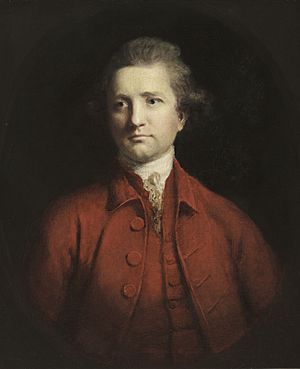Alexander Dow facts for kids

Alexander Dow (born 1735 or 1736 in Perthshire, Scotland – died July 31, 1779, in Bhagalpur, India) was a Scottish writer, playwright, and army officer. He worked for the East India Company, a powerful British trading company that operated in India. Dow was also known for his studies of Eastern cultures, which is why he is called an "Orientalist."
Contents
Alexander Dow's Life
Starting His Journey
Alexander Dow grew up in Crieff, Perthshire, Scotland. His father worked for the Customs in Dunbar. Alexander was trained for a business career in Eyemouth. However, he suddenly left on a ship called the King of Prussia as a midshipman (a junior officer in the navy).
He traveled to Bencoolen, a city in Indonesia. There, he became a secretary to the Governor. Officials from the East India Company in Calcutta (now Kolkata, India) noticed his skills. He joined the company's army as an ensign (a low-ranking officer) in the Bengal infantry on September 14, 1760. He quickly moved up the ranks, becoming a lieutenant on August 23, 1763, and a captain on April 16, 1764.
Writing and Plays
In 1768, Alexander Dow returned to Britain for a break. During this time, he published two important translations. One was Tales translated from the Persian of Inatulla of Delhi. The other was the History of Hindostan, translated from the Persian of Ferishta, which was a translation of a work by Firishta. Both books were very popular.
The next year, Dow wrote a play called Zingis. It was a five-act tragedy about Genghis Khan, a famous historical leader. The play was performed successfully at the Drury Lane theatre in London.
Later Life and Legacy
After his success, Dow went back to India. He was promoted to lieutenant-colonel on February 25, 1769. In 1772, he published a continuation of his history of Hindostan. This part covered events up to the death of Aurungzeb, another important ruler. This work also included two essays: 'On the Origin and Nature of Despotism in Hindostan' and 'An Enquiry into the State of Bengal.'
In 1774, he returned to England again. His second play, Sethona, was produced by David Garrick at Drury Lane. This play was a verse tragedy set in ancient Egypt. It was performed for nine nights.
Alexander Dow returned to India one last time. He passed away in Bhagalpur on July 31, 1779.
What Alexander Dow Wrote
- Tales Translated from the Persian of Inatulla of Delhi (1768)
- Zingis (1769) - a five-act tragedy play
- Sethona (1774) - a tragedy play written in verse
 | George Robert Carruthers |
 | Patricia Bath |
 | Jan Ernst Matzeliger |
 | Alexander Miles |

